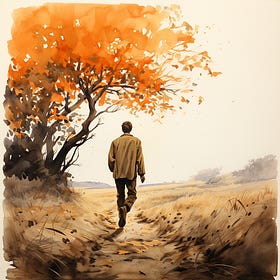We can all find ourselves in situations where the life of someone who is very important to us turns upside down. Their partner dies, they suffer a serious accident, a sick child is born, their house burns down, or they discover they have a terminal illness. What should we do in these situations?
Our usual coping mechanisms fail. Humor doesn’t work, suggesting smart solutions provokes anger, our questions are met with silence, and it’s impossible to divert attention from what consumes their entire consciousness — the tragedy.
Let’s face it, these situations are incredibly difficult for two reasons. First, because we must watch our family member or friend be picked up by life and thrown down with such force that we wonder if they will ever be able to stand up again. Secondly, because this immediately stirs our own fear that this could happen to us at any moment.
Many react to this by disappearing, while others frantically search for solutions. If we find a solution, then when a similar moment arrives in our life, we might feel we can control it. While running from our own fears, we often don’t realize how much we hurt the other person with our actions. They often don’t need us to mask the weight of the tragedy with humor, because what’s swept under the rug still stinks even if it’s out of sight. Offering clever solutions doesn’t help, as their spirit is crushed, and they might not even have the strength to eat a slice of bread, let alone implement long-term plans. This just burdens them with an overwhelming and unmanageable to-do list, making them feel even more incapacitated, which leads to anger. Our questions about the exact situation lead nowhere. Trust that they have thought through every possible, even impossible, solution. Sometimes, there is no solution.
Trying to distract them from the tragedy is like pretending there isn’t an elephant in the middle of the room. These reactions communicate to the person that it’s very uncomfortable for us to be with them in this situation and we expect them to change that. This is all about us. Our fears, our discomfort. And this doesn’t help.
Such situations are not only a test of courage for the person it happens to — although, undoubtedly, they have it the hardest — but also for those around them.
The advice most give to family and friends is, “Just be there for them!” The problem is, we often don’t know how. But it’s not that hard.
Let me quote Adrienne Haslet-Davis — who lost her left leg in an accident and since then has been sharing her experiences to help others support their loved ones better:
“Sense the temperature of the room! If they’re angrily throwing things, give them something they can throw! If they laugh at the TV when you think they should be crying, laugh with them! If they sit in silence, sit with them in silence!… Just be present!”
It’s important to be aware of the emotional stages one usually goes through after a tragedy. Knowing the stages of grief helps us help. Not to suppress or avoid the feelings, but to process them.
And one more crucial point: never say that we know what the other person is going through unless we truly have been through the same thing. Let’s not take away their right to feel weak, uncertain, sad, or anything else for as long as they need. Let’s not inadvertently communicate that here we are, having already experienced and overcome this!
Admitting that we have no clue what they’re going through but we love them deeply, are there for them, and our deepest desire is to understand them has immense power.
– Eszter
Related Articles
Grief — The Emotional Mariana Trench
Walk Through the Difficulties!
Home | Notes | Articles | Eszter’s Magic | Literary Bonbons | Short Stories and Guides | Beyond the Book | EWE Issues | Archive | About






